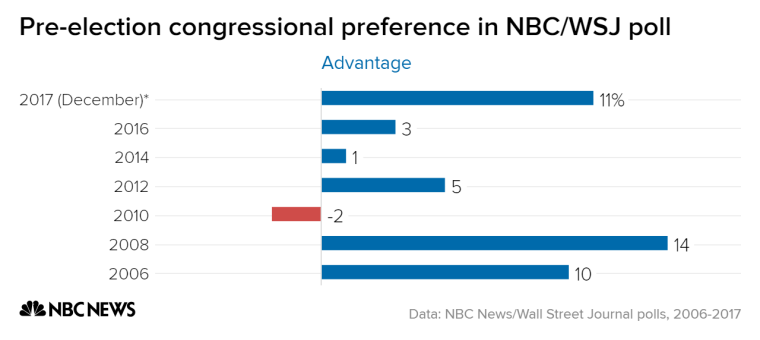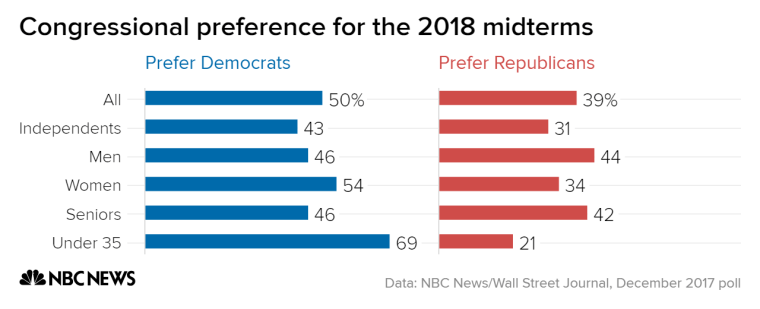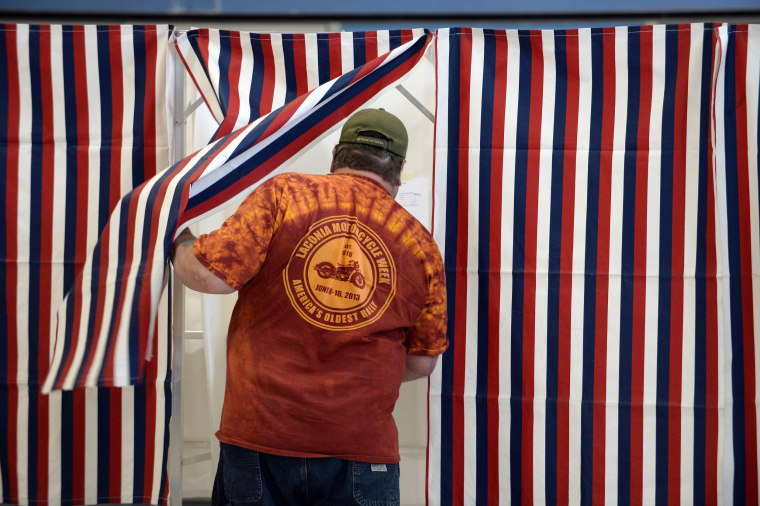WASHINGTON — Fresh off their victory in Alabama’s special Senate election, Democrats now enjoy their largest advantage in congressional preference in nine years, according to the latest NBC News/Wall Street Journal poll, signaling a dangerous political environment for Republicans entering next year’s midterm elections.
Fifty percent of registered voters say they prefer a Democratic-controlled Congress, versus 39 percent who want Republicans in charge.

The last time Democrats both held a double-digit lead and hit 50 percent on this question in the NBC/WSJ poll was September 2008, right before the party won the White House and picked up a substantial number of House and Senate seats.
This past October, Democrats had a 7-point advantage on congressional preference, 48 percent to 41 percent.
In this most recent poll, Democrats hold a whopping 48-point lead in congressional preference among voters ages 18-34 (69 percent to 21 percent), a 20-point lead among female voters (54 percent to 34 percent) and a 12-point lead among independent voters (43 percent to 31 percent).
By contrast, Republicans have a 2-point edge among white voters (46 percent to 44 percent) and a 12-point advantage with whites without a college degree (50 percent to 38 percent).
Notably, Democrats lead among male voters by 2 points, 46 percent to 44 percent, and among seniors by 4 points, 46 percent to 42 percent.

The NBC/WSJ poll also shows Democrats with the intensity advantage, with 59 percent of Democratic voters saying they have a high level of interest in next year’s elections (registering either a 9 or 10 on a 10-point scale), versus 49 percent of Republican voters saying the same thing.
Additionally, 62 percent of voters who said they voted for Hillary Clinton in 2016 have a high level of interest in next year’s midterms, compared with 50 percent of Trump voters.
"A double-digit margin here is an important indicator of Democratic intensity," said Republican pollster Bill McInturff of Public Opinion Strategies, who conducted this survey with Democratic pollsters from Hart Research Associates.
And the NBC/WSJ poll — which was conducted right after Democrats’ surprising Senate victory in Alabama — finds President Donald Trump’s job approval rating at 41 percent among all Americans, which is up three points from October, while 56 percent of Americans disapprove.
But those who “strongly disapprove” of Trump’s job (48 percent) outnumber those who say they “strongly approve” (24 percent) by a 2-to-1 margin.
“All in all, I think a 41 percent Trump approval and an +11D lead in the control of Congress definitely puts control of the Senate and the House as more doable for Democrats in 2018,” said Democratic pollster Fred Yang of Hart Research Associates.
The NBC/WSJ poll was conducted Dec. 13-15 of 900 adults – nearly half reached by cell phone – and it has an overall margin of error of plus-minus 3.3 percentage points. The margin of error among the 736 registered voters is plus-minus 3.6 percentage points.

